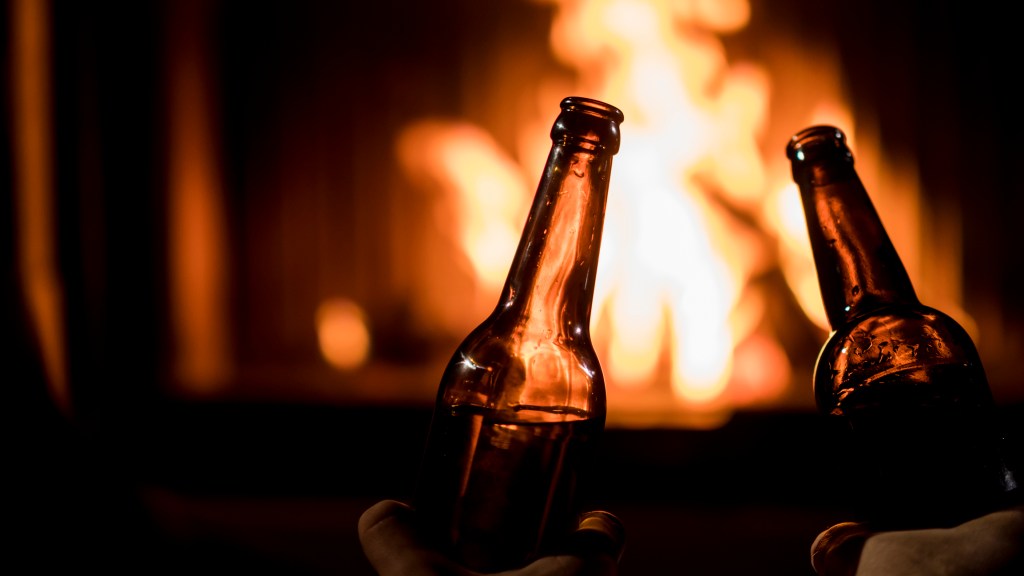
With summer in the rearview mirror, my beery thoughts now turn to heartier ales. Once the weather takes a turn for the chillier, I love to warm up in front of a fireplace with what I refer to as fireside sippers.
Fireside sippers are beers that tend to be higher in alcohol. They’re often malt-forward and are big enough that you’d never consider just gulping them down. The mouthfeel should be thick and chewy — a beer you can spend some time with, letting its higher-octane power coat your insides with liquid toastiness. Many of these beers are inspired by early brewers who came up with ingenious ways to make it through harsh winters before indoor heating was commonplace.
Here are five of the best types of beer for sipping by the fire, along with my favorite American- and California-made versions:
Imperial stout: These dark beers were first brewed in England for Peter the Great, which is why they’re often known as Russian imperial stouts. Usually 8 to 12% ABV, the dark, roasted malts give them coffee, dark chocolate and dried fruit notes balanced by sweet aromas from the high alcohol.
We’re lucky to have one of the best imperial stouts in the world brewed in California: North Coast’s Old Rasputin Imperial Stout. Other good local ones include Firestone Walker’s Parabola, Stone Imperial Stout (and also Fyodor), Sierra Nevada’s Narwhal and AleSmith’s Speedway Stout.
Barleywine: This is another style that originated in England. Originally dark beers, they evolved into more golden brews starting in the 1950s, although they remained quite strong (8 to 12% ABV). American versions are more bitter and hoppy, while English varieties are malt-forward with toffee and dark fruit, taking on sherry-like notes as they age. Sierra Nevada’s Bigfoot is one of the best examples of an American Barleywine, along with AleSmith’s Old Numbskull, Drake’s Hopocalypse, and Deschutes’ Black Mirror. Good English-style ones include Firestone Walker’s Sucaba, Pelican Brewing’s The Mother of All Storms, and Lost Abbey’s The Angel’s Share.
Old ale, strong ales and wee heavy: A group of similar strong ales originating in Britain, English strong ale is the most common of these beers, which range from 5.5 to 11% ABV. The term typically is used as a catch-all for breweries making an in-between beer. Old ales or stock ales are stronger malt-forward ales, while the delightfully named wee heavys are Scottish beers similar to English barley wine, but with more caramel character.
American craft brewers are making similar beers in this amalgamation of styles, and some good ones locally are Firestone Walker’s Double DBA, AleSmith’s Wee Heavy (and their Olde Ale), North Coast’s Old Stock Ale and Drake’s Headzo.
Tripels: Tripels are made with three times the malt used in a typical Trappist table beer. They were first made in Belgium in the 1930s. Golden in color, they’re usually 8 to 11% ABV with creamy, dense heads. The Belgian yeast imparts great complexity, and they’re generally sweet with fruit and spice notes.
Westmalle Tripel is the original from the Trappist brewery that created the style in 1934, and it’s still one of the best. Some good American versions are Allagash Tripel (and the barrel-aged Curieux), The Bruery’s Trade Winds and Cuver Tripel.
Rauchbier and smoked beer: Rauchbier is a German beer style that originated in Bamberg in the 1500s. It uses smoked malt to give the beer strong smoked aromas and flavors. Other breweries occasionally use smoked malt to make a smoked version of their own beer styles.
The most well-known Rauchbier is from Aecht Schlenkerla, and they brew several different smoked beers, including a Märzen, Weizen (Wheat), Urbock and Oak Smoke Double Bock. They’re a little harder to find locally, though one of the best is Alaskan Smoked Porter. Another great option is Dim Lights from Moonlight Brewing in Santa Rosa.
Hungry? All of these beers also tend to pair well with heavier, heartier dishes, steaks and other meat dishes, so now’s the time for classic stews, prime rib, beef Bourguignon, shepherd’s pie, meatloaf or pot roast.
Contact Jay R. Brooks at BrooksOnBeer@gmail.com.

















































